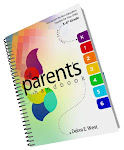Tuesday, November 30, 2010
Monday, November 29, 2010
How To Get The Best Education Possible: Tip #56
I have posted the intelligence before, but by request I am adding them to my How to Get The Best Education Possible: Tips for Parents.
Posted by Unknown at 2:00 PM 0 comments
Labels: How to Get the Best Education Possible for Your Child, Tips for parents
Sunday, November 28, 2010
Skip Burgers, Breathe Easier
Posted by Unknown at 2:00 PM 0 comments
Labels: Health and the family, Tips for parents
Saturday, November 27, 2010
Butter or Margarine?
Posted by Unknown at 2:00 PM 1 comments
Labels: Health and the family, Tips for parents
Friday, November 26, 2010
KIPP Schools- Schools that Work!
Posted by Unknown at 2:00 PM 2 comments
Labels: How to Get the Best Education Possible for Your Child, Tips for parents
Thursday, November 25, 2010
Happy Thanksgiving!
I hope everyone is having a wonderful Thanksgiving. Please remember to say a prayer for our soldiers serving overseas and their families. One other thing to remember today, keep every child in your thoughts today because every child deserves "The Best Education Possible" and chance to make their dreams come true. HAPPY THANKSGIVING EVERYONE!!!
Posted by Unknown at 12:00 PM 1 comments
Labels: Best Wishes
Wednesday, November 24, 2010
Thanksgiving Card Activity
Posted by Unknown at 2:00 PM 0 comments
Labels: Health and the family, Tips for parents
Tuesday, November 23, 2010
How To Get The Best Education Possible: Tip #55
Posted by Unknown at 2:00 PM 0 comments
Labels: How to Get the Best Education Possible for Your Child, Tips for parents
Monday, November 22, 2010
How To Get The Best Education Possible: Tip #54
At 212 degrees, it boils.
And with boiling water, comes steam.
And steam can power a locomotive. That brings us to tip #54.
Tip #54: Teach your children about 212 degrees!
I was given a small book as a gift, 212 Degrees the Extra Degree, by Sam Parker and Mac Anderson. They state that by raising the temperature of water by one extra degree means the difference between something that is simply very hot and something that generates enough force to power a machine. It reminds us that seemly small things can make tremendous differences. 212 degrees is not only a message of action, it's a message of persistent and additional action. We must realize in order to reap the greatest rewards that are possible we must apply one extra degree of effort. If we apply this simple theory and teach our children to push a little harder, there would be nothing we couldn't accomplish.
Now that you're aware of "212 degrees - the extra degree," no longer should you be able to do only what is expected of you, because with this awareness comes responsibility to yourself, your family, and to others. 211 degrees can serve a purpose, but 212 degrees is the extra power that will move any obstacles, and get results that required by additional effort. So, teach your children about 212 degrees of power and establish it in your own life. You will experience the reward and extraordinary success.
Posted by Unknown at 2:00 PM 0 comments
Labels: How to Get the Best Education Possible for Your Child, Tips for parents
Sunday, November 21, 2010
How Not To Worry About The Pounds At The Thanksgiving Feast!
Posted by Unknown at 2:00 PM 0 comments
Labels: Health and the family
Saturday, November 20, 2010
Are You at Risk For Diabetes?
1. A body mass index of 25 or higher (go to cdc.gov/bmi for a BMI calculator)
2. Exercising fro fewer than 20 minutes three times per week.
3. A immediate family member with diabetes
4. High blood pressure
5. Low HDL ("good") cholesterol or high triglycerides
6. Polycystic ovary syndrome
7. Gestational diabetes, or giving birth to a baby weighing more than 9 pounds.
8. Being of African-American, Indian, or Pacific Islander descent.
Posted by Unknown at 2:00 PM 0 comments
Labels: Health and the family
Friday, November 19, 2010
How To Get The Best Education Possible: Tip #53
Posted by Unknown at 2:00 PM 0 comments
Labels: How to Get the Best Education Possible for Your Child
Thursday, November 18, 2010
How To Get The Best Education Possible: Tip #52
Posted by Unknown at 2:00 PM 0 comments
Labels: How to Get the Best Education Possible for Your Child, Tips for parents
Wednesday, November 17, 2010
How To Get The Best Education Possible: Tip #51
Posted by Unknown at 2:00 PM 0 comments
Labels: How to Get the Best Education Possible for Your Child, Tips for parents
Tuesday, November 16, 2010
How To Get The Best Education Possible: Tip #50
Posted by Unknown at 12:00 PM 0 comments
Labels: How to Get the Best Education Possible for Your Child, Tips for parents
Monday, November 15, 2010
How To Get The Best Education Possible: Tip #49
Posted by Unknown at 2:00 PM 2 comments
Labels: Best Education Possible Citizen's Initiative, Health and the family
Sunday, November 14, 2010
Is It a Cold or Allergies?
1. Cold: Often comes with a sore throat or low-grade fever; tends to cause congestion with yellowish mucus; is associated with isolated sneezes; and gets better in about a week.
2. Allergy: Is associated with itchiness; tends to produce clear runny mucus; often induces fits of sneezing; can persist as long as the allergen is present.
Posted by Unknown at 2:00 PM 0 comments
Labels: Health and the family, Tips for parents
Saturday, November 13, 2010
"Waiting For Superman"

Posted by Unknown at 4:26 PM 1 comments
Labels: How to Get the Best Education Possible for Your Child, Tips for parents
You Have To Change Your Mind!
Posted by Unknown at 2:00 PM 0 comments
Labels: Health and the family, tips for women
Friday, November 12, 2010
How To Get The Best Education Possible: Tip #48
Posted by Unknown at 2:00 PM 0 comments
Labels: How to Get the Best Education Possible for Your Child, Tips for parents
Thursday, November 11, 2010
How To Get The Best Education Possible: Tip #47
Posted by Unknown at 2:00 PM 0 comments
Labels: How to Get the Best Education Possible for Your Child, Tips for parents
Wednesday, November 10, 2010
How To Get The Best Education Possible: #46
Posted by Unknown at 2:00 PM 0 comments
Labels: How to Get the Best Education Possible for Your Child, Tips for parents
Tuesday, November 9, 2010
How To Get The Best Education Possible: Tip #45
Posted by Unknown at 2:00 PM 0 comments
Labels: How to Get the Best Education Possible for Your Child, Tips for parents
Monday, November 8, 2010
How To Get The Best Education Possible: Tip #44
Posted by Unknown at 2:00 PM 0 comments
Labels: How to Get the Best Education Possible for Your Child, Tips for parents
Sunday, November 7, 2010
Cooking Traditional Meals
Posted by Unknown at 2:00 PM 0 comments
Labels: Health and the family, Tips for parents
Saturday, November 6, 2010
Fitness and Your Child
Posted by Unknown at 2:00 PM 0 comments
Labels: Health and the family, Tips for parents
Friday, November 5, 2010
How To Get The Best Education Possible: Tip #44
Posted by Unknown at 2:00 PM 0 comments
Labels: How to Get the Best Education Possible for Your Child, Tips for parents
Thursday, November 4, 2010
How To Get The Best Education Possible: Tip #43

Posted by Unknown at 2:00 PM 0 comments
Labels: How to Get the Best Education Possible for Your Child, Tips for parents
Wednesday, November 3, 2010
How To Get The Best Education Possible: Tip #42
Tip #42: Read aloud with your child.
Reading aloud can expand your children's vocabulary, and your conversations can help them understand and enjoy reading more. This is how you can help your child become a lifelong reader. So, regardless of your child's age or comprehension level, continue to read together ritual. Maximize your time with these four suggestions:
1. Pick books that your child can read and understand easily . Shelve books that seem way over your child's head. It's tempting to push his/her literary limits, but the goal is understanding and enjoying.
2. Listen to audio books. It's not cheating, really; it's a terrific way to engage kids. Press "Play" during car rides or after dinner.
3. Revisit favorites. A second read is a great chance to discuss subtleties and encourage him/her to move beyond just the plot.
4. Find out what your child is interested in and look for books on that topic.
Posted by Unknown at 2:00 PM 1 comments
Labels: How to Get the Best Education Possible for Your Child, Tips for parents
Tuesday, November 2, 2010
How To Get The Best Education Possible: Tip #41
Posted by Unknown at 2:00 PM 0 comments
Labels: How to Get the Best Education Possible for Your Child, Tips for parents
Monday, November 1, 2010
VOTE! VOTE! VOTE!

Posted by Unknown at 4:00 PM 0 comments
Labels: Empowerment and Personal Responsibility through Education
How To Get The Best Education Possible: Tip #40
Posted by Unknown at 2:00 PM 0 comments
Labels: How to Get the Best Education Possible for Your Child, Tips for parents




































